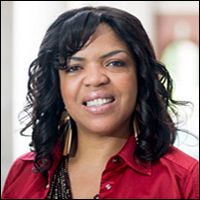
A new National Science Foundation-funded report published in AERA Open documents the negative effects labels and stereotypes are having on high-achieving Asian and Black college students.

Vanderbilt professor Ebony O. McGee studied the collegiate experiences and academic and career decisions of 61 Black, Latin and Asian advanced undergraduate STEM college students from six U.S. postsecondary institutions.
“The interviews we conducted show that high-achieving Black students are working to defy stereotypes of intellectual inferiority, while Asian students are trying to uphold the ‘model minority’ stereotype about their intellectual superiority,” said McGee, who has bachelor and master’s degrees in engineering and a PhD in mathematics education. “Both racial groups expend a lot of energy—materially and psychologically—as a result of being stereotyped and marginalized.”
“The labels don’t surprise me, although I can say I’ve never heard them in conversation,” said William H. Robinson, associate dean for academic success and a professor of electrical and computer engineering in the Vanderbilt School of Engineering. “I can certainly relate to my own experiences of being an exception to others’ expectation.”
Robinson, who was not part of this report, has collaborated with McGee on National Science Foundation research studies that focus on diversity in the STEM fields. They have examined the critical factors that result in African Americans being one of the most underrepresented racial groups in engineering faculty positions.
‘Asian fail’ is no joke
Asian participants reported they felt their peers expected them to achieve in STEM, assuming their high marks came easier because of their race. This caused additional stress and pressure to perform.
One participant, “Yong,” an aerospace engineering major, recalled a professor announcing his grade in front of the class, an 89. Classmates chuckled and one said, “This is like an ‘Asian fail,’ right? Don’t go jump off a building or shoot yourself over it!”
After the incident, Yong became consumed by thoughts of failure, and while preparing for the final exam didn’t eat or sleep for 38 hours straight. A few hours after taking the final, he had to be hospitalized for exhaustion and dehydration.
“Black genius’ isn’t a compliment
High-achieving Black students reported being met with either skepticism or hyperbole when out-scoring their White and Asian classmates.
An African American participant, “Leonard,” recalled a humiliating moment that followed when his professor announced he had received the second highest test score in the class.
A female student exclaimed, “Wow, this test was so hard. He has got to be some kind of Black genius!”
Leonard, a high achieving electrical engineering major, was relieved to not be called a cheater, which had happened in the past. But it was crushing to hear that a classmate assumed because he was Black, he could not have earned his grade in any other way than to be a “Black genius.”

Associate Dean Robinson offered his own example: “I dislike being called “articulate” because it sounds like the person is surprised that I can speak coherently. Even if the intent of the person is a genuine compliment, the impact on me is negative,” said Robinson, who has collaborated with McGee on the Explorations in Diversifying Engineering Faculty Initiative. EDEFI investigates the institutional, technical, social, and cultural factors that affect the decision-making, career choices, and career satisfaction for doctoral students, postdoctoral scholars, and faculty who have been marginalized by race and/or gender.
As chair of the working group on values of the School of Engineering, Robinson said a welcoming, diverse and inclusive culture that reflects respect, collegiality and intellectual freedom is one of the school’s four foundational values: “We demonstrate the value of diversity and inclusion through our educational practice, our workplace culture, our hiring practices, and our engagement with the community.”
The power of racialized labeling
“Racialized labels foster marginalization, which can have negative effects on the body and the mind,” McGee said. “I argue that both of these racial groups endure emotional distress because each responds with an unrelenting motivation to succeed that imposes significant costs.”
In the report, she encourages coalition-building among racial groups in order to build psychosocial coping skills, as well as other strategies for dealing with the effects of stereotypes and labeling.
“This research reveals the collective subjugation of these students, regardless of whether they are judged as highly competent or less than capable,” McGee says in the report. “Educators and researchers have much to gain from examining both the unique and shared forms of racialization of the two racial groups—and both groups have much to learn from each other.”